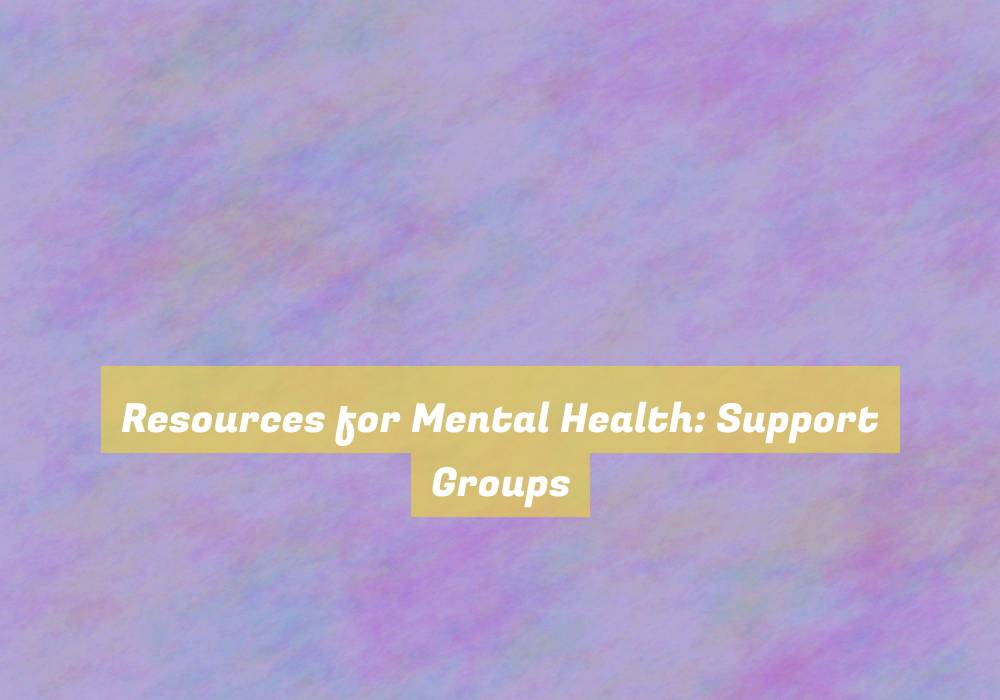Resources for Mental Health: Support Groups
When it feels like the weight of the world is on your shoulders, sometimes it can be comforting to know that there are others who understand and can share the burden.
Support groups are like beacons of light in a storm, offering a safe space for individuals to connect, share experiences, and find solace in a community that understands.
But how do you find the right support group for your specific needs? And what are the benefits of joining one?
LetG??s explore the world of support groups and how they can be a valuable resource for your mental health journey.
Benefits of Joining Support Groups
Joining a mental health support group can provide you with a sense of belonging and understanding that may be difficult to find elsewhere. It offers a safe space where you can share your experiences and emotions without fear of judgment. Being part of a support group allows you to connect with others who are going through similar challenges, helping you feel less isolated and alone in your struggles.
In these groups, you can gain valuable insights and coping strategies from individuals whoG??ve firsthand experience dealing with mental health issues. Hearing their stories and learning how they manage their conditions can provide you with a sense of hope and inspiration. Additionally, being surrounded by people who truly understand what youG??re going through can help reduce feelings of loneliness and alienation.
Moreover, support groups often offer a platform for learning about resources, treatment options, and mental health education. You may discover new techniques for managing symptoms and find comfort in knowing that you arenG??t alone in your journey towards better mental well-being. The encouragement and empathy within these groups can be incredibly empowering, fostering a sense of community and understanding.
How to Find the Right Support Group
If youG??re searching for the right support group, start by identifying your specific mental health needs and the type of support youG??re looking for. Consider whether you require a support group for a particular mental health condition such as anxiety, depression, bipolar disorder, or schizophrenia.
Reflect on the kind of support you need, whether itG??s emotional support, coping strategies, or practical advice. Once you have a clear understanding of your needs, start your search by consulting mental health professionals. Therapists, counselors, and psychiatrists often have information about local support groups and can provide recommendations based on your specific requirements.
Additionally, utilize online resources and directories that specialize in mental health support groups. Websites like Psychology Today, NAMI (National Alliance on Mental Illness), and Meetup.com offer search tools to find support groups in your area.
You can also inquire at local community centers, religious organizations, or hospitals, as they sometimes host or have information about support groups. Lastly, consider reaching out to friends, family members, or colleagues who may know about support groups that align with your needs.
Finding the right support group may take some effort, but connecting with others who understand your experiences can be incredibly beneficial for your mental health.
Online Support Group Platforms
When seeking mental health support groups, itG??s essential to explore available online platforms as they can offer convenient access to a diverse range of supportive communities. One popular online support group platform is 7 Cups, which provides anonymous and confidential emotional support from trained listeners. It also offers group support chats on various mental health topics.
Another widely used platform is SupportGroups.com, where you can find a wide array of online support groups for different mental health conditions, including depression, anxiety, and PTSD. These platforms typically allow you to connect with others who are experiencing similar challenges, share coping strategies, and access valuable resources.
Reddit is home to numerous mental health support communities known as subreddits. These communities provide a space for individuals to share their experiences, seek advice, and offer support to one another.
Additionally, Facebook groups have become increasingly popular for connecting individuals with similar mental health concerns. These groups often facilitate discussions, share informative articles, and provide a platform for members to express themselves in a supportive environment.
When exploring online support group platforms, itG??s important to prioritize your privacy, safety, and the credibility of the information shared within these communities.
Local In-Person Support Groups
Explore local in-person support groups in your area to connect with individuals facing similar mental health challenges and access valuable resources and support. Meeting face-to-face with others who understand what youG??re going through can provide a sense of community and understanding thatG??s hard to replicate online.
Local support groups often offer a safe and confidential space for sharing experiences, advice, and coping strategies. You can inquire about these groups at community centers, mental health clinics, or through local mental health organizations. These groups may focus on specific mental health conditions such as anxiety, depression, or bipolar disorder, or they may be more general in nature, welcoming individuals with various mental health challenges.
Participating in these groups not only provides emotional support but also allows you to learn from othersG?? experiences and gain insight into different treatment options. Additionally, many local support groups invite mental health professionals to speak and provide valuable information.
Take the step to seek out these local in-person support groups and see the positive impact they can have on your mental health journey.
Conclusion
Overall, support groups can provide you with a sense of community, understanding, and valuable resources for managing your mental health.
Whether you choose to join an online or in-person group, the benefits can be significant.
Remember to take the time to find the right group for you, and donG??t hesitate to reach out for help and support when you need it.
You arenG??t alone in your journey towards better mental health.






